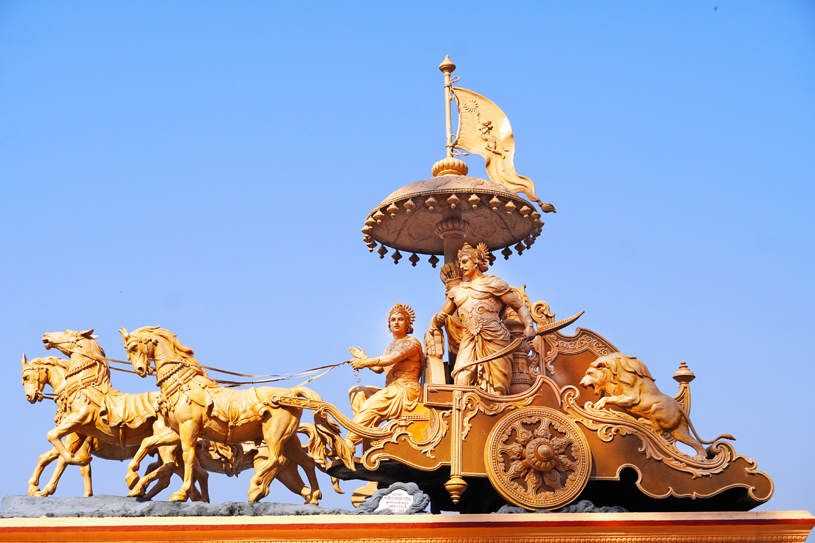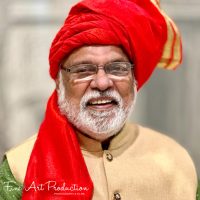How the Message of Diwali Relates to Countering Terrorism
By Raj Shah

Diwali, the Hindu festival of lights, is a celebration of good over evil, knowledge over ignorance, and hope over despair. It is a time to reflect on the victory of dharma, or righteousness, over adharma, or unrighteousness.
The story of Diwali is the story of Lord Rama’s victory over the demon king Ravana. Ravana had kidnapped Rama’s wife, Sita, and Rama fought a great battle to rescue her. In the end, Rama defeated Ravana and returned home with Sita.
Diwali is a reminder that good always triumphs over evil, even in the darkest of times. It is a message of hope and resilience.
In the context of terrorism, Diwali can be seen as a celebration of the human spirit’s ability to overcome adversity. It is a reminder that even in the face of darkness, there is always light. Terrorists seek to spread fear and division. They want to make us feel hopeless and powerless. But Diwali teaches us that good will always triumph over evil. It teaches us that we are stronger together.
In recent years, the world has witnessed a rise in terrorism, a hateful ideology that seeks to spread fear and division. Terrorists target people of all faiths and backgrounds, and their attacks have caused immense suffering and loss.
Israel-Hamas War: The Struggle for Good Amidst Turmoil
 In the midst of the ongoing Israel-Hamas war, the message of Diwali shines a light on the struggle for good amidst the turmoil. This festival of light and positivity reminds us that even in the darkest of times, there is always hope and the potential for positive change.
In the midst of the ongoing Israel-Hamas war, the message of Diwali shines a light on the struggle for good amidst the turmoil. This festival of light and positivity reminds us that even in the darkest of times, there is always hope and the potential for positive change.
Just as Lord Rama fought against the demon king Ravana, the people of Israel and Palestine are grappling with their own battles. In the midst of the violence and conflict, Diwali calls for unity, understanding, and forgiveness. It urges both sides to seek dialogue and find common ground in order to pave the way for a peaceful resolution.
The lighting of diyas during Diwali represents the victory of light over darkness. It serves as a symbol of hope for Israel and Palestine as they navigate their way through this difficult period. The festival’s message of harmony and new beginnings offers a path forward, towards healing wounds and fostering understanding.
The Israel-Hamas war may seem insurmountable, but Diwali teaches us that good can triumph over evil. By embracing the spirit of this celebration and seeking light amidst the turmoil, we can work towards a more peaceful and harmonious future for both nations. It is through the power of unity, compassion, and forgiveness that we can truly overcome the challenges we face.
Unmasking Hamas: Taking hostages is a terrorist act, and it is not helping the Palestinian goal of having a two-state solution.
 Hamas, the Palestinian militant group in control of the Gaza Strip, has been known to resort to extreme measures in their fight against Israel. One of the most horrific acts they engage in is the taking of innocent people as hostages. This blatant disregard for human life is not only morally repugnant but also a clear act of terrorism.
Hamas, the Palestinian militant group in control of the Gaza Strip, has been known to resort to extreme measures in their fight against Israel. One of the most horrific acts they engage in is the taking of innocent people as hostages. This blatant disregard for human life is not only morally repugnant but also a clear act of terrorism.
By taking innocent civilians hostage, Hamas shows a complete lack of empathy and respect for the lives of those they claim to fight for. These innocent individuals become pawns in their dangerous game, subjected to unimaginable suffering and trauma.
The act of taking hostages goes against all international norms and values. It is a cowardly tactic used to instill fear and manipulate others for political gain. Hamas must be held accountable for their actions and recognized as the terrorists they truly are.
As we delve deeper into the impact of Hamas’ actions on the people of Gaza, it is important to unmask the true nature of this militant group and shed light on their appalling tactics. Only then can we begin to address the devastating consequences faced by the innocent civilians caught in the crossfire of this ongoing conflict.
Diwali’s Teachings

On this Diwali, it is important to remember that terrorism can never defeat the human spirit. We must stand together and fight for the values that we hold dear: peace, tolerance, and compassion.
Diwali teaches us that the battle against terrorism is not solely a physical one; it is also a battle of ideologies. Just as the diyas are lit to banish darkness, we must light the flame of knowledge and education to eradicate the ignorance that breeds terrorism. It is through education and spreading awareness that we can dispel the darkness of extremism and create a more peaceful world.
On this Diwali, let us light a diya for hope, for unity, and for the triumph of good over evil. Together, we can overcome terrorism and build a better future for all.
Diwali’s Teachings in Practice: Examples of Light Overcoming Darkness in the Real World

Diwali’s teachings are not limited to ancient stories and symbolism; they have practical applications in our modern world. There are numerous examples of light overcoming darkness in real-world situations, proving that the message of Diwali is more relevant than ever in the face of terrorism.
The first watershed example of unity among people was the 9/11 attack in New York in 2000 by a terrorist group called ISIS. The 9/11 attacks were a defining moment in American history.
They were the deadliest terrorist attacks on U.S. soil, and they left a profound impact on the country.
In the aftermath of the attacks, Americans came together in a way that had not been seen in decades. They united in their grief, their anger, and their resolve to defend their country.
Here are some specific examples of how Americans came together after the 9/11 attacks:
- People donated blood and money to help the victims of the attacks and their families.
- Volunteers came together to help with search and rescue efforts and to provide support to the bereaved.
- Americans from all walks of life came together to show their support for the country, including by attending patriotic rallies and flying the American flag.
- There was a renewed sense of national unity and purpose as Americans came together to defend their country against terrorism.
A similar powerful example comes from the city of Mumbai, which experienced a horrific terrorist attack in 2008 by another terrorist group from Pakistan. In the aftermath of the tragedy, the city came together in a remarkable display of unity and resilience. People from all walks of life, regardless of religion or background, joined hands to support and help one another. This act of solidarity illuminated the darkness left by the terrorists, proving that the spirit of Diwali can triumph even in the darkest of times.
Lessons From Diwali: Strategies for Overcoming Terrorism
Rama was only willing to go to war with Ravana after all peaceful attempts to get Sita back had failed. He knew that war would result in the deaths of many innocent people, but he felt that he had no other choice.
Lord Rama tried a peaceful approach to get Sita back in the following ways:
- Rama sent Hanuman to Lanka to deliver a message of peace to Ravana.
- As a second attempt, Rama sent Angada, the son of Bali, to Ravana with another message of peace.
- And lastly, Rama asked Vibhishana, Ravana’s own brother, to act as a mediator.
But Ravana did not listen to any of them.
After all these efforts, Rama had to go to war against Ravana to rescue Sita and restore peace to the world.
Similarly, after the 9/11 attacks, the United States launched the War on Terror, which included a number of peace approaches, such as:
- Diplomacy: The US engaged in diplomacy with Pakistan, Afghanistan, and other countries in the region to try to build support for the War on Terror and to share intelligence.
- Humanitarian aid: The US provided humanitarian aid to Afghanistan and other countries in the region to help people who had been displaced by the war.
- Economic development: The US invested in economic development projects in Afghanistan and other countries in the region to try to create jobs and improve living conditions.

However, these peace approaches were not successful in preventing the rise of ISIS. ISIS was founded in 2004, and it began to gain prominence in the early 2010s. The US launched a military campaign against ISIS in 2014.
The War on Terror was necessary to prevent future terrorist attacks. The US needed to take military action to remove the Taliban from power in Afghanistan and to dismantle al-Qaeda. Similarly, the US needed to invade Iraq to prevent Saddam Hussein from developing weapons of mass destruction.
The debate over the War on Terror is complex, and there is no easy answer. It is important to consider all sides of the argument before forming an opinion.
Similarly, India had to carry out a surgical strike against Pakistan in 2016, following the Uri attack. The attack was carried out by the Indian Army on September 29, 2016, against militant launch pads across the Line of Control (LoC) in Jammu and Kashmir. The Indian government carried out the strike as a necessary response to the Uri attack, which had killed 19 Indian soldiers. The strike was a necessary step to deter Pakistan from sponsoring terrorism against India.
A balanced approach to defeating terrorism
 A balanced approach to defeating terrorism is one that combines military and non-military measures to address the root causes of terrorism, prevent radicalization, and combat terrorist organizations.
A balanced approach to defeating terrorism is one that combines military and non-military measures to address the root causes of terrorism, prevent radicalization, and combat terrorist organizations.
It is important to note that there is no one-size-fits-all approach to defeating terrorism, and the best approach will vary depending on the specific context.
However, some key elements of a balanced approach include:
- Addressing the root causes of terrorism
- Preventing radicalization
- Combating terrorist organizations
- Educate ourselves and others about the dangers of extremism.
- Reject all forms of hatred and intolerance.
- Promote understanding and respect for all cultures and religions.
- Support organizations that are working to combat terrorism and extremism.
- Speak out against violence and hatred whenever and wherever we see it.
It is important to note that all of these elements are important, and a balanced approach requires that they be given equal weight. For example, a focus on military action alone will not be effective in defeating terrorism if the root causes of the problem are not addressed. Similarly, a focus on preventing radicalization alone will not be effective if terrorist organizations are not dismantled; similarly, Rama destroyed Ravan and asked Ravan’s brother Vibhushan to rule Lanka.
It is also important to ensure that all counter-terrorism measures are implemented in a way that respects human rights and the rule of law. Otherwise, these measures may alienate the public and make it more difficult to defeat terrorism in the long run.
About the Author
 A software engineer by profession, Indian culture enthusiast, ardent promoter of hinduism, and a cancer survivor, Raj Shah is a managing editor of Desh-Videsh Magazine and co-founder of Desh Videsh Media Group. Promoting the rich culture and heritage of India and Hinduism has been his motto ever since he arrived in the US in 1969.
A software engineer by profession, Indian culture enthusiast, ardent promoter of hinduism, and a cancer survivor, Raj Shah is a managing editor of Desh-Videsh Magazine and co-founder of Desh Videsh Media Group. Promoting the rich culture and heritage of India and Hinduism has been his motto ever since he arrived in the US in 1969.
He has been instrumental in starting and promoting several community organizations such as the Indian Religious and Cultural Center and International Hindu University. Raj has written two books on Hinduism titled Chronology of Hinduism and Understanding Hinduism. He has also written several children books focusing on Hindu culture and religion.































